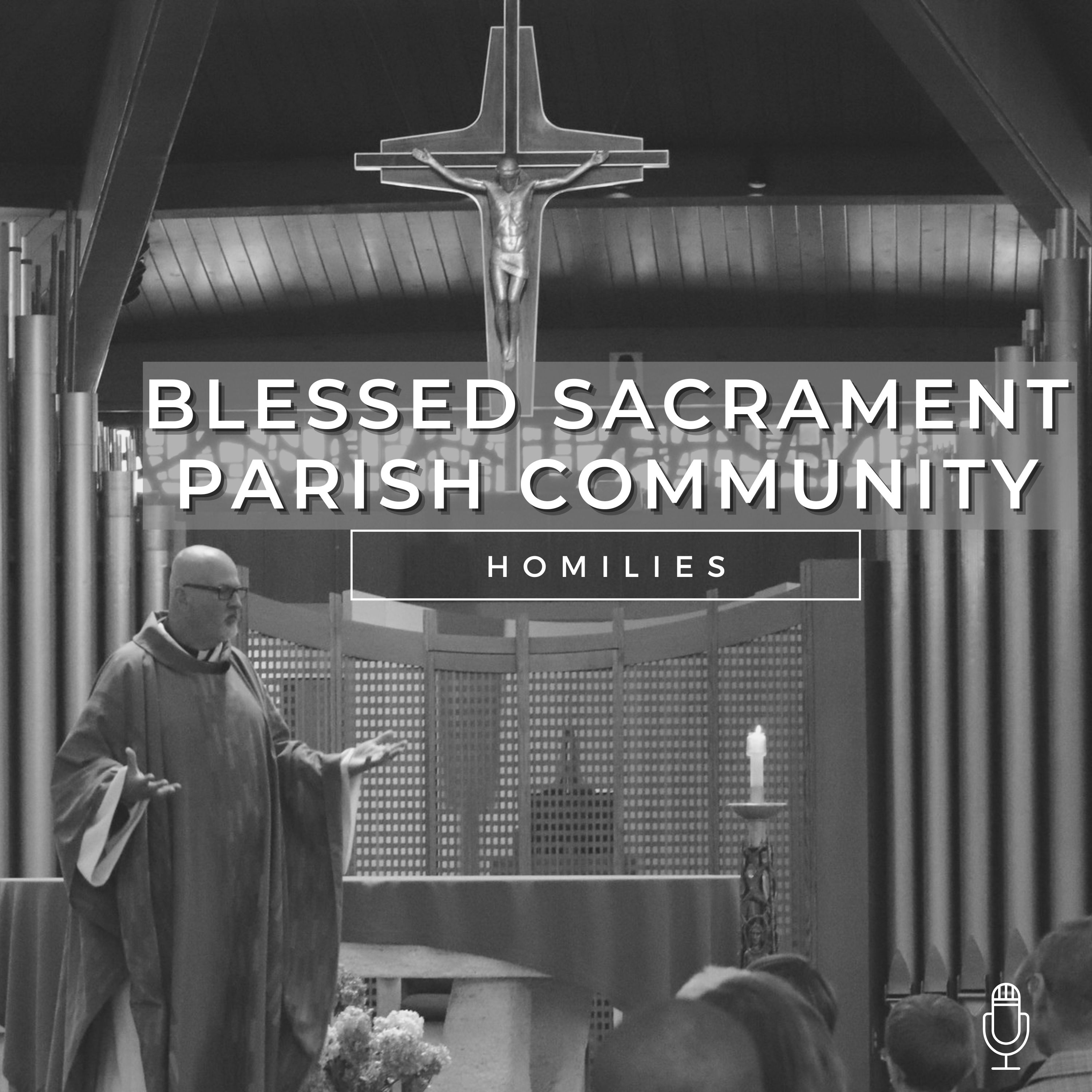Episode Transcript
[00:00:12] Speaker A: Welcome to the Blessed Sacrament Homilies podcast, where our mission is to help everyone recognize and experience the presence of God. We hope you are nourished and encouraged by the Word. Thank you for joining us.
[00:00:25] Speaker B: The Lord be with you and with your spirit.
[00:00:28] Speaker C: A reading from the Holy Gospel according to John.
[00:00:31] Speaker D: Glory to you, O Lord.
[00:00:33] Speaker B: As Jesus passed by, he saw a man blind from birth. His disciples asked him, rabbi, who sinned, this man or his parents that he was born blind?
Jesus answered, neither he nor his parents sinned.
[00:00:52] Speaker C: It is so the works of God.
[00:00:54] Speaker B: Might be made visible through. Through him.
[00:00:57] Speaker C: We have to do the works of the One who sent me while it.
[00:01:01] Speaker B: Is still day, night is coming when no one can work while I am in the world, I am the light of the world.
When he had said this, he spat on the ground and made clay with the saliva and smeared the clay on his eyes and said to him, go wash in the pool of Siloam, which means sent.
So he went and washed and came back able to see.
His neighbors and those who had seen him earlier as a beggar said, isn't this the one who used to sit and beg?
Some said, it is, but others said, no, he just looks like him.
He said, I am.
So they said to him, how were your eyes opened?
He replied, the man called Jesus made clay and anointed my eyes and told me, go to Siloam and wash.
So I went there and washed and was able to see.
And they said to him, where is he?
He said, I don't know.
They brought the one who was once blind to the Pharisees.
Now Jesus had made clay and opened his eyes on a Sabbath.
So then the Pharisees also asked him how he was able to see.
He said to them, he put clay on my eyes and I washed, and now I can see.
So some of the Pharisees said, this man is not from God because he does not keep the Sabbath.
But others said, how can a sinful man do such signs?
And there was division among them.
So they said to the blind man again, what do you have to say about him since he opened your eyes?
He said, he is a prophet now. The Jews did not believe that he had been blind and gained his sight.
[00:03:18] Speaker C: Until they summoned the parents of the.
[00:03:20] Speaker B: One who had gained his sight.
[00:03:22] Speaker C: They asked them, is this your son.
[00:03:25] Speaker B: Who you say was born blind?
How does he now see?
His parents answered and said, we know that this is our son and that he was born blind.
We do not know how he sees now, nor do we know who opened his eyes.
[00:03:45] Speaker C: Ask him.
[00:03:47] Speaker B: He is of age. He can speak for himself.
His parents said this because they were afraid of the Jews.
[00:03:55] Speaker C: For the Jews had already agreed that.
[00:03:57] Speaker B: If anyone acknowledged him as the Christ, he would be expelled from the synagogue.
For this reason, his parents said, he is of age. Question him.
So a second time, they called the man who had been blind and said to him, give God the praise. We know that this man is a sinner.
He replied, if he is a sinner, I do not know.
One thing I do know is that I was blind and now I see.
So they said to him, what did he do to you? How did he open your eyes?
He answered them, I told you already and you did not listen. Do you want to hear it again?
Do you want to become his disciples too?
They ridiculed him and said, you are that man's disciple. We are disciples of Moses.
We know that God spoke to Moses, but we do not know where this one is from.
The man answered and said to them, this is what is so amazing that you do not know where he is from. Yet he opened my eyes.
We know that God does not listen to sinners. But if one is devout and does his will, he listens to him.
It is unheard of that anyone ever opened the eyes of a blind person.
If this man were not from God, he would not be able to do anything.
They answered and said to him, you were born totally in sin, and you are trying to teach us.
Then they threw him out.
When Jesus heard that they had thrown him out, he found him and said, do you believe in the Son of Man?
He answered and said, who is he, sir, that I may believe in him?
Jesus said to him, you have seen him, and the one speaking with you is he.
He said, I do believe, Lord. And he worshiped him.
Then Jesus said, I came into this world for judgment, that those who do not see might see. And those who do see might become blind.
Some of the Pharisees who were with.
[00:06:34] Speaker C: Him heard this and said to him.
[00:06:36] Speaker B: Surely we are not blind, are we?
Jesus said to them, if you were blind, you would have no sin. But now you are saying, we see, so your sin remains the Gospel of the Lord.
[00:06:59] Speaker C: A reminder again that it's always important when we hear these stories of miracles in the Gospel, that they're always bigger than the actual miracle. They're meant to point to a deeper truth and to teach us an important lesson about our relationship with God.
[00:07:15] Speaker B: And more importantly, how God relates and cares for us.
[00:07:21] Speaker C: And here we see the ultimate irony in that the man that was Born.
[00:07:27] Speaker B: Blind is the one that actually sees.
[00:07:30] Speaker C: With his heart, the heart of faith. And the ones that are clearly blind are the Pharisees, who are unable to see that in God's love, great and marvelous things happen and that that love can supersede anything else in the world.
Now, in our 21st century understanding of things, we would find it not only ludicrous, but evil to think that because.
[00:08:03] Speaker B: Someone was blind, it was because of.
[00:08:05] Speaker C: Sin, that either they sinned or even worse, that their parents had sinned.
But this is what the Pharisees began to convince themselves of.
And what that did was twofold. It created an environment where they didn't have to care for anybody who was suffering, because it was simply God punishing you for something you did so they could easily walk back without any empathy, without any sympathy.
But the other part of it, the one that was truly the blindness that they had, was that because they convinced themselves that suffering was God's punishment, they also convinced themselves that if their life.
[00:08:48] Speaker B: Was going, if they had enough to.
[00:08:51] Speaker C: Eat, if they had a place to live, if they were healthy and their family was healthy, boy, they must be doing things right.
They haven't screwed up. God loves them.
And they couldn't see their sinfulness or their brokenness so stuck in their misunderstanding of God's relationship to us that they also couldn't look past the fact that Jesus healed this man on the Sabbath, making God present in the world, which is what the Sabbath was supposed to do. Create an environment where the people could experience God. Here God was right before them. They couldn't even see it. So they got offended because they thought he did work on the Sabbath and it was sin. Their hearts were so hardened.
Well, what does it say to us today in the 21st century?
It says to us that, one, we must act as Jesus did. Meaning when we see one suffering, not just blindness, but any type of suffering, we should have a generous and empathetic love for those people. We should give them from our heart, as Jesus did.
And the other part of it is that we recognize that just because our life is going great doesn't mean we're doing everything right. That we always have to sit back and look at our actions and the way we treat one another and recognize where we need to see anew, where we need to repent and make the changes we need to make.
And lastly, never ever underestimate God's power to bring grace into our world and into our lives.


